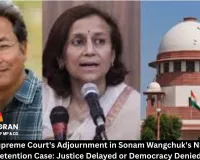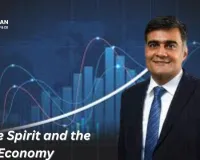Rozgar Mela: Beyond a Job, a Call to National Service
Digital Desk
Prime Minister Narendra Modi's distribution of 51,000 appointment letters at the 16th Rozgar Mela in July 2025 is more than a routine government event; it is a significant milestone in India's long-standing effort to tackle employment.
With the declaration that recruits are entering "national service," the initiative underscores a strategic shift from viewing government jobs merely as secure employment to positioning them as a cornerstone for national development.
This event, which pushed the total placements under the Rozgar Mela initiative past the one million mark, highlights a modern approach to empowering the youth and accelerating the nation's progress.
The Rozgar Mela: A Modern Employment Drive
The Rozgar Mela, launched in 2022, represents the current government's large-scale, direct approach to employment generation. The July 2025 event was a vivid demonstration of its scale and impact.
-Scale and Reach: The 51,000 new recruits will join various central government departments, including crucial sectors like Railways, Health, Postal Services, and Financial Services, strengthening the country's public service framework.
-A National Mission: During the event, Prime Minister Modi emphasized that the government is working on a "war footing" to create jobs, focusing on transforming India's demographic dividend into a strategic asset for becoming a developed nation or 'Viksit Bharat'. He stated that the convergence of India's vast youth population and its robust democracy forms an "infinite power" that is recognized globally.
Historical Context: The Evolution of Rural Employment Schemes
To fully appreciate the Rozgar Mela, one must view it as the latest chapter in India's long history of employment guarantee programs. Past schemes have laid the groundwork for today's initiatives.
-Sampoorna Grameen Rozgar Yojana (SGRY): Launched in 2001, the SGRY was a significant program that merged earlier schemes like the Employment Assurance Scheme (EAS) and Jawahar Gram Samridhi Yojana (JGSY). Its goal was to provide gainful employment and food security in rural areas, implemented through Panchayati Raj institutions with a focus on self-targeting for those below the poverty line.
-The Foundation of MGNREGA: The landmark Mahatma Gandhi National Rural Employment Guarantee Act (MGNREGA) was passed in 2005, creating a legal guarantee for 100 days of wage employment. However, analyses suggest that the scheme has faced challenges from its inception, including debates over its delinking from statutory minimum wages and persistent issues with fund allocations and payments, as highlighted by a recent Parliamentary Committee.
A Multi-Pronged Strategy for a Modern Workforce
The government's current employment strategy extends far beyond the Rozgar Mela, embracing a holistic vision that includes self-employment, private sector jobs, and strategic sectoral growth.
-Fostering Self-Employment: The Prime Minister's Employment Generation Programme (PMEGP) is a key pillar, offering credit-linked subsidies to help individuals set up micro-enterprises, especially in the non-farm sector. This initiative has been instrumental in supporting entrepreneurship and creating sustainable livelihoods.
-Incentivizing Private Sector Employment: A major new announcement is the Pradhan Mantri Viksit Bharat Rozgar Yojana. Effective from August 2025, this scheme provides a ₹15,000 incentive to youth landing their first private sector job and offers monthly incentives to employers for new hires. With a budget of nearly ₹1 lakh crore, it aims to catalyze the creation of 3.5 crore new jobs.
-Boosting Manufacturing and Innovation: The government is also focusing on a 'Manufacturing Mission' to strengthen 'Make in India'. Prime Minister Modi highlighted that electronics manufacturing has seen a fivefold increase in the last 11 years, and the Production Linked Incentive (PLI) scheme has already generated over 1.1 million jobs.
A Nation Building Its Future
The distribution of 51,000 appointment letters is a powerful symbol of a larger, dynamic mission. By combining direct recruitment through Rozgar Melas with initiatives that boost self-employment, private sector hiring, and strategic industries, the government is building a multi-layered framework for employment.
When the Prime Minister instructs new recruits that they are entering "national service," it elevates the purpose of these roles beyond personal livelihood to a collective contribution in building a 'Viksit Bharat'.
The true success of these efforts will be measured by their ability to provide sustainable, long-term employment and harness the full potential of India's youth in the years to come.

2.jpg)
.jpg)




1.jpg)



